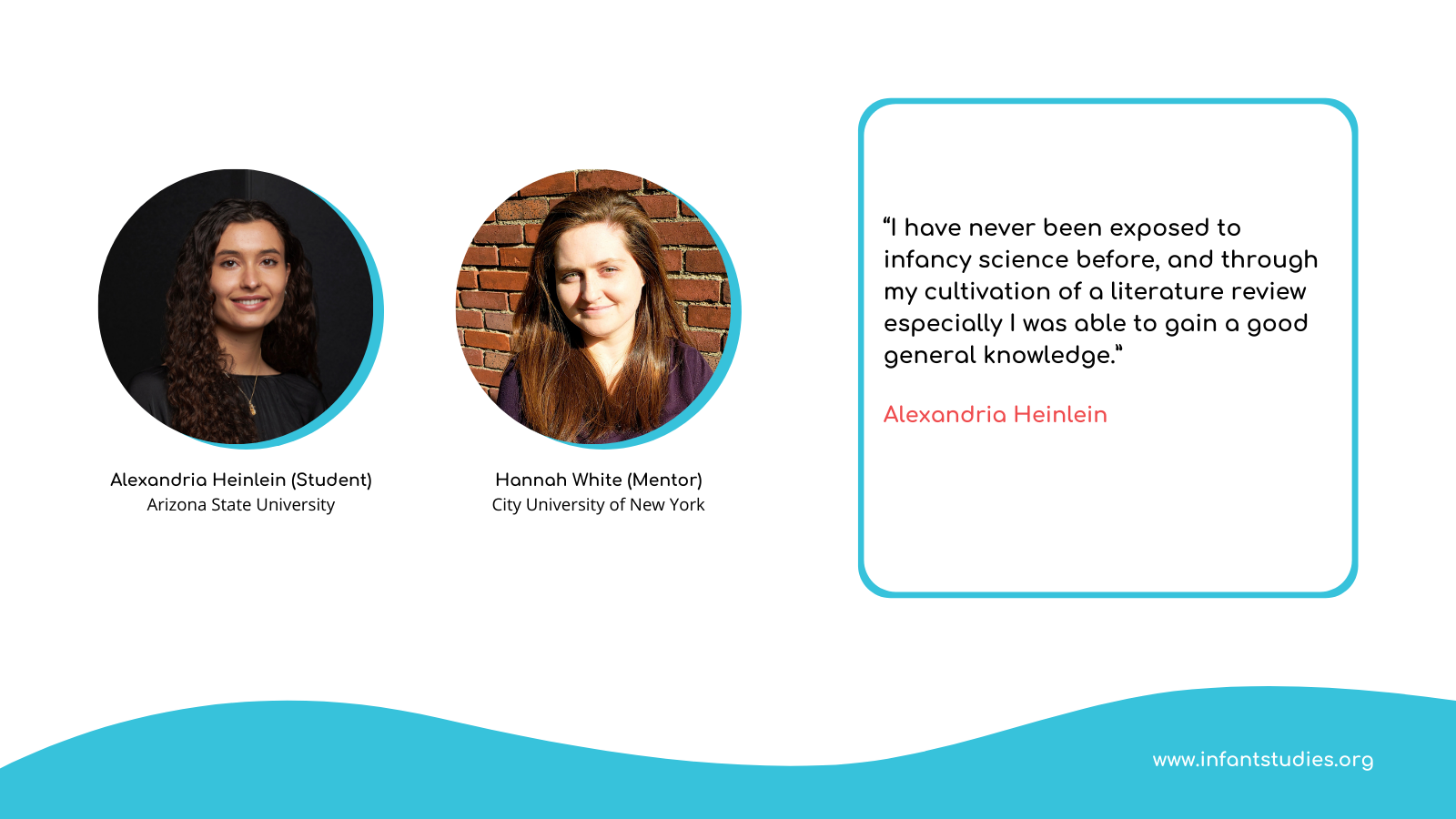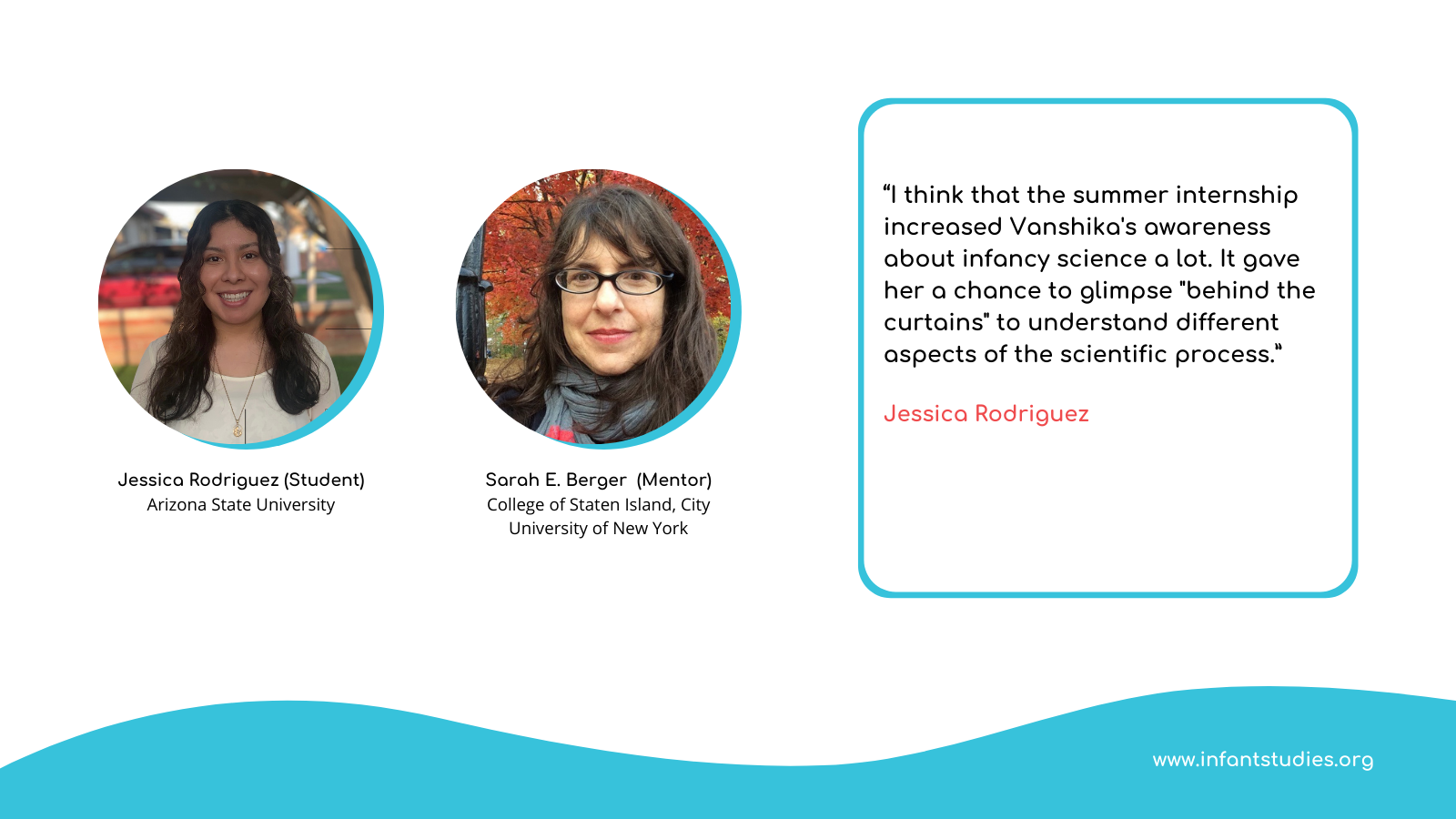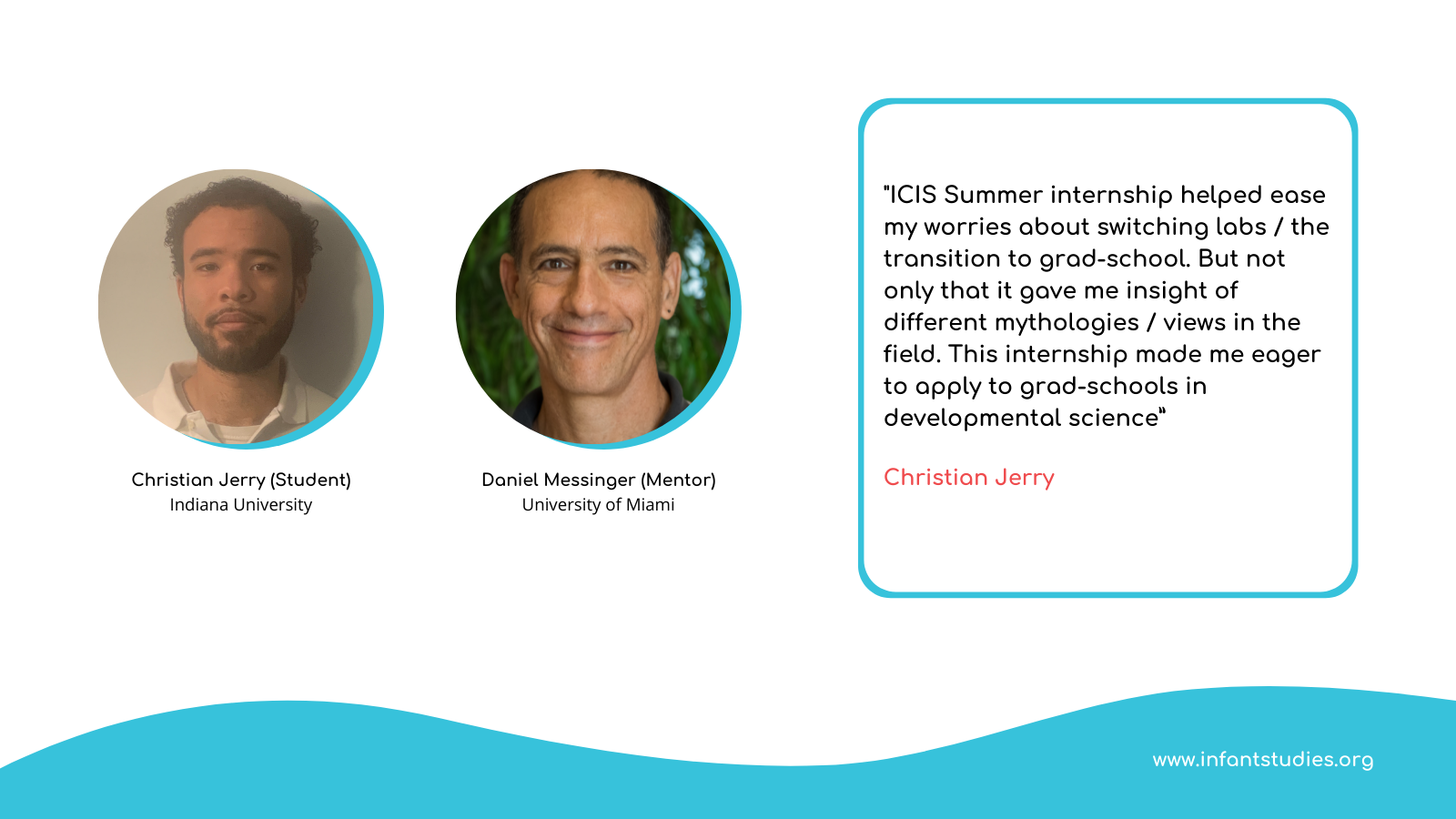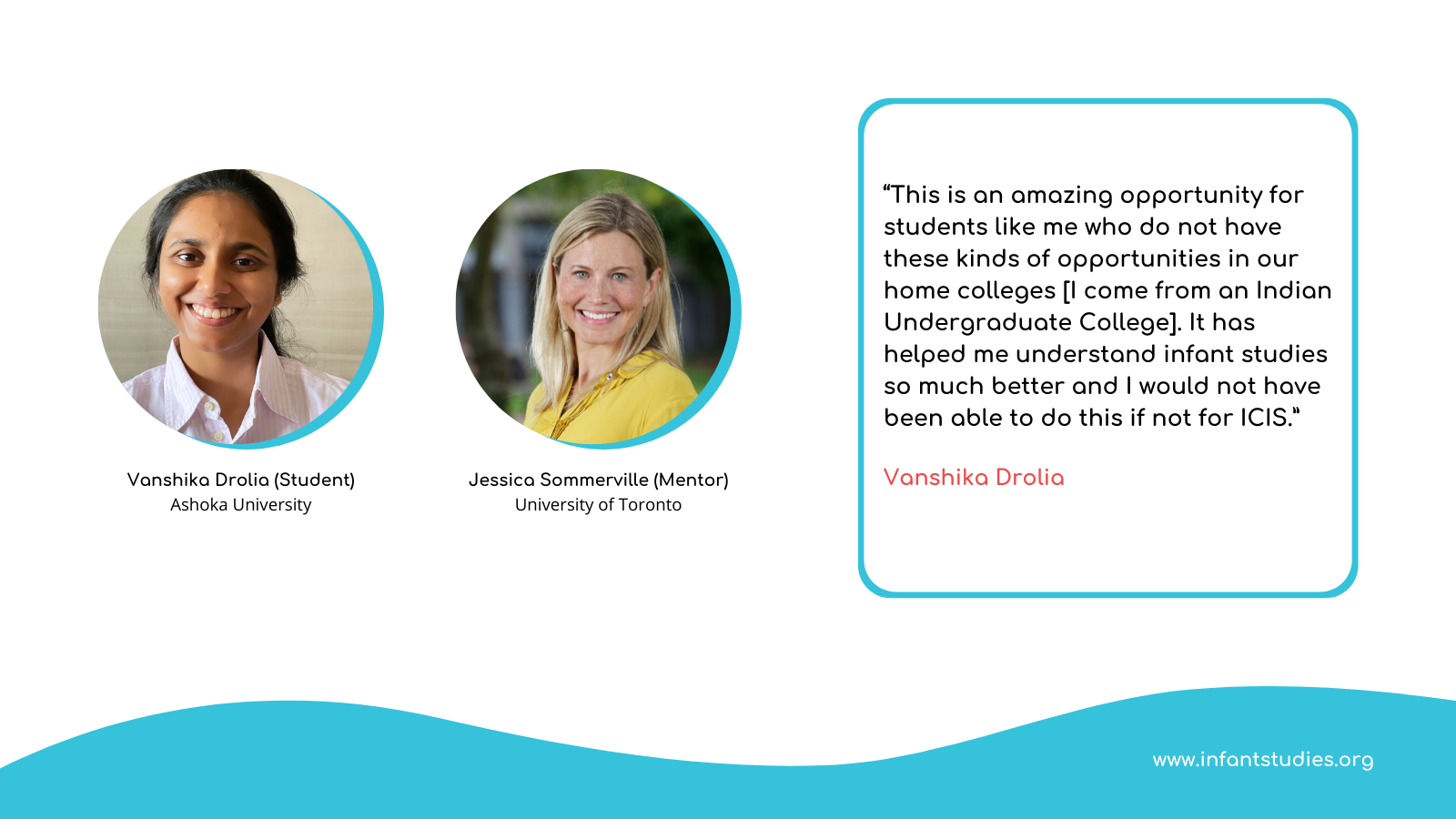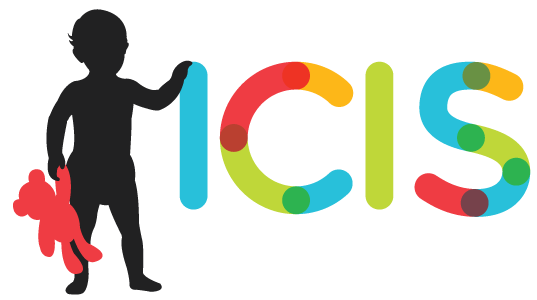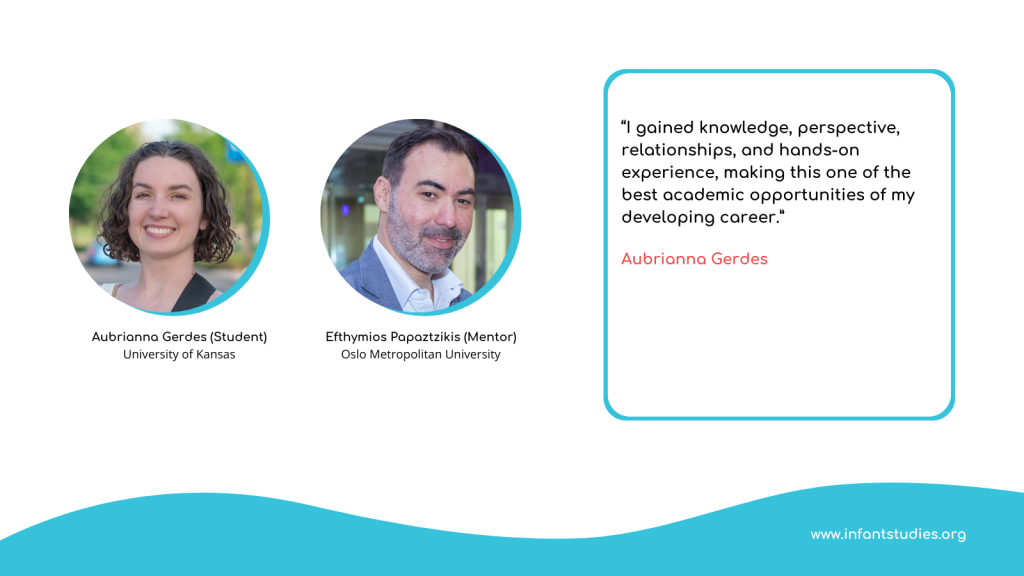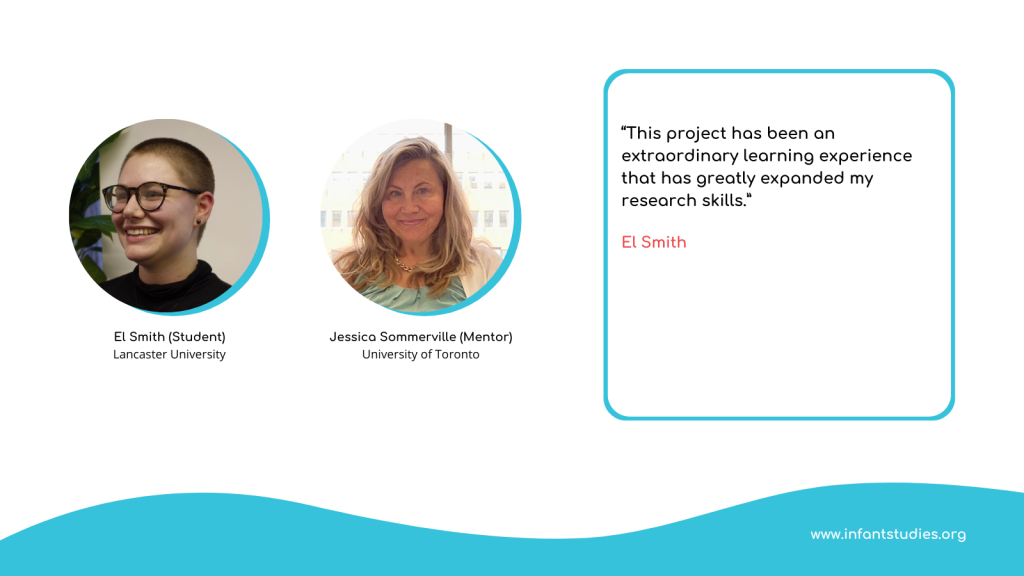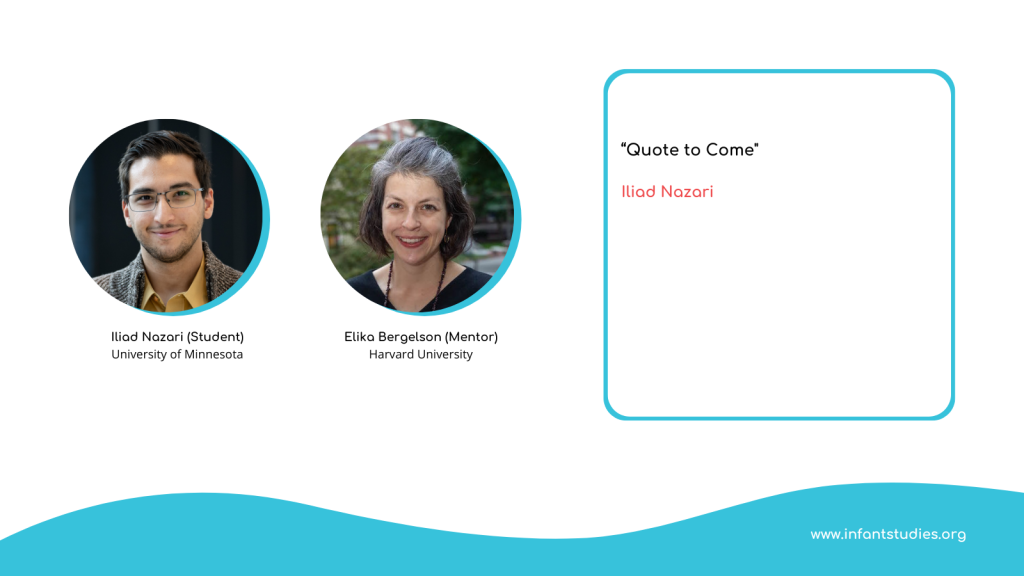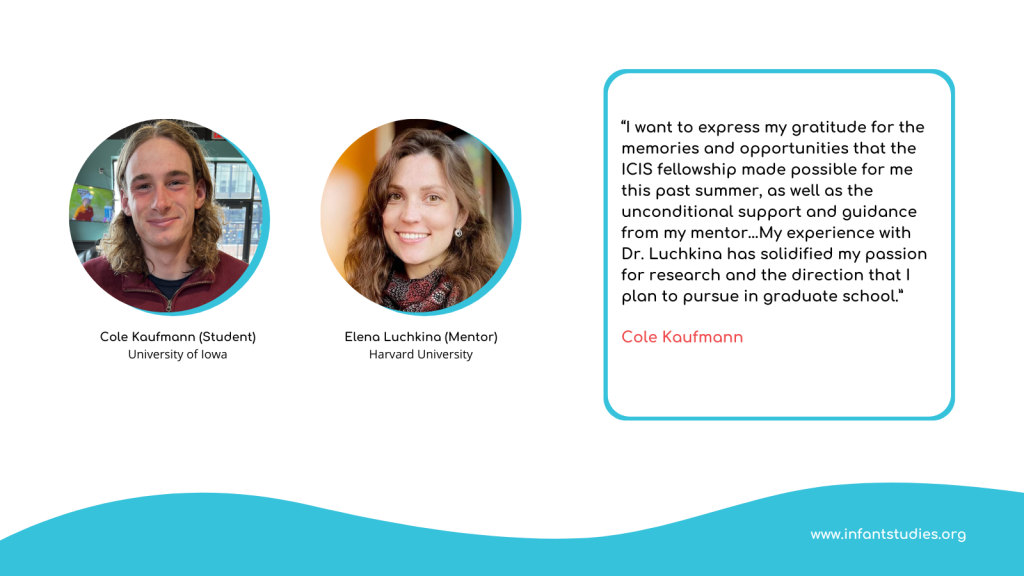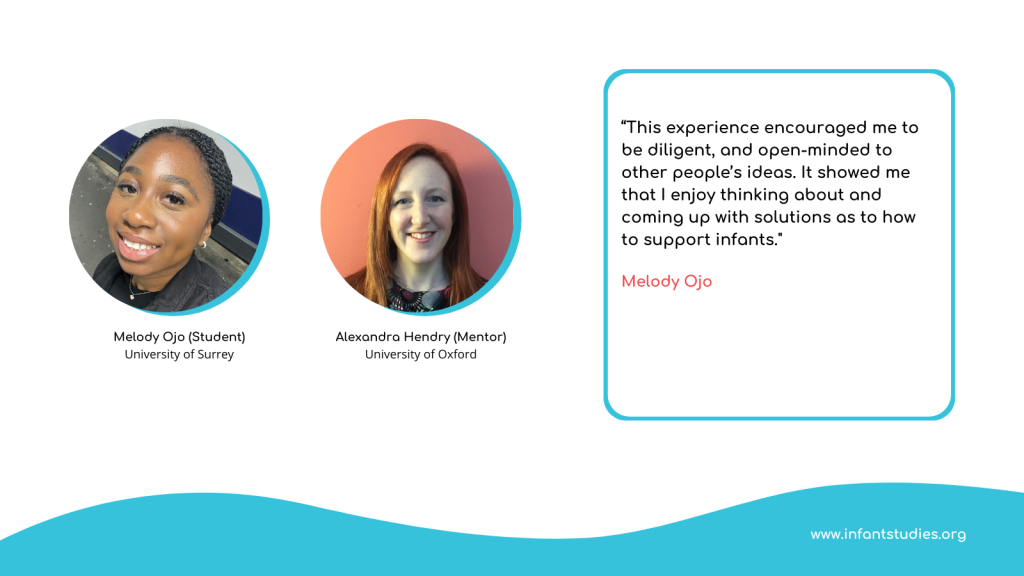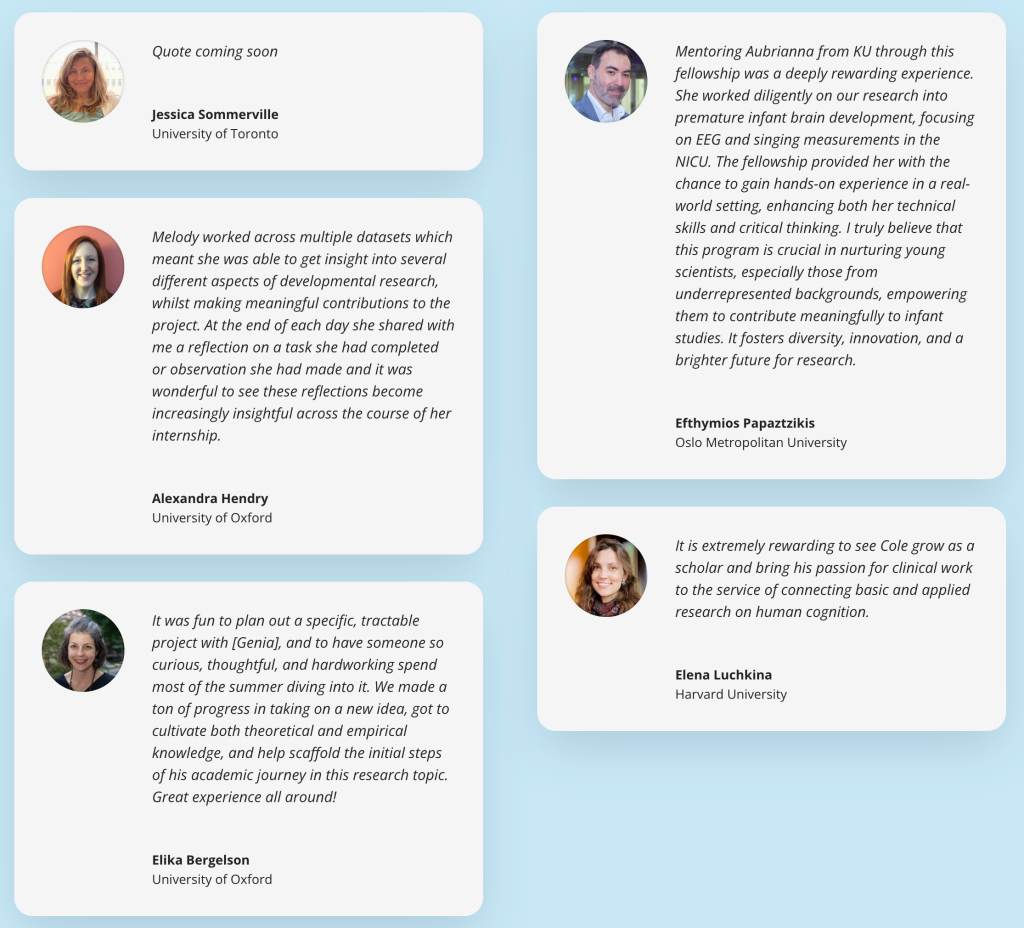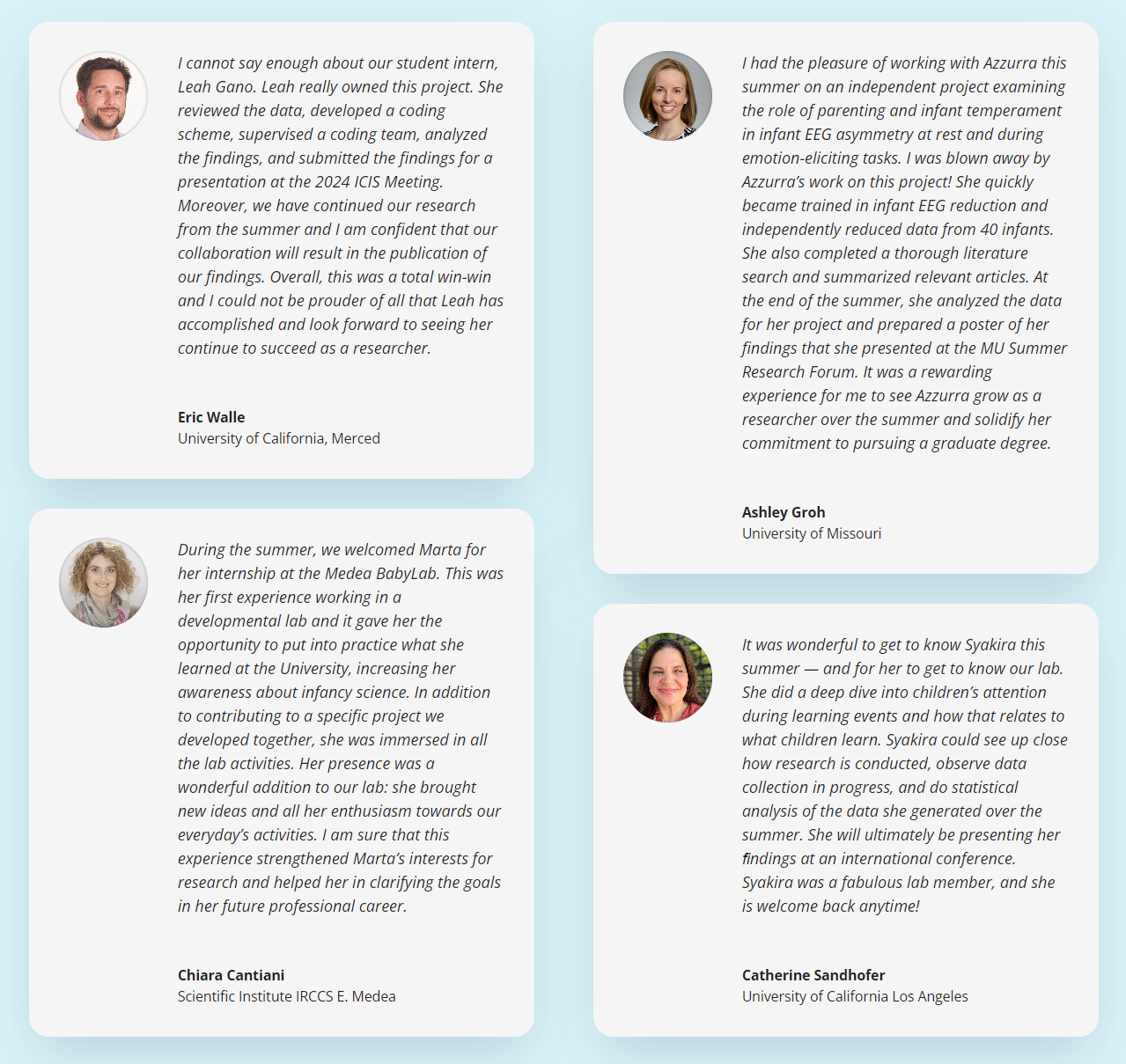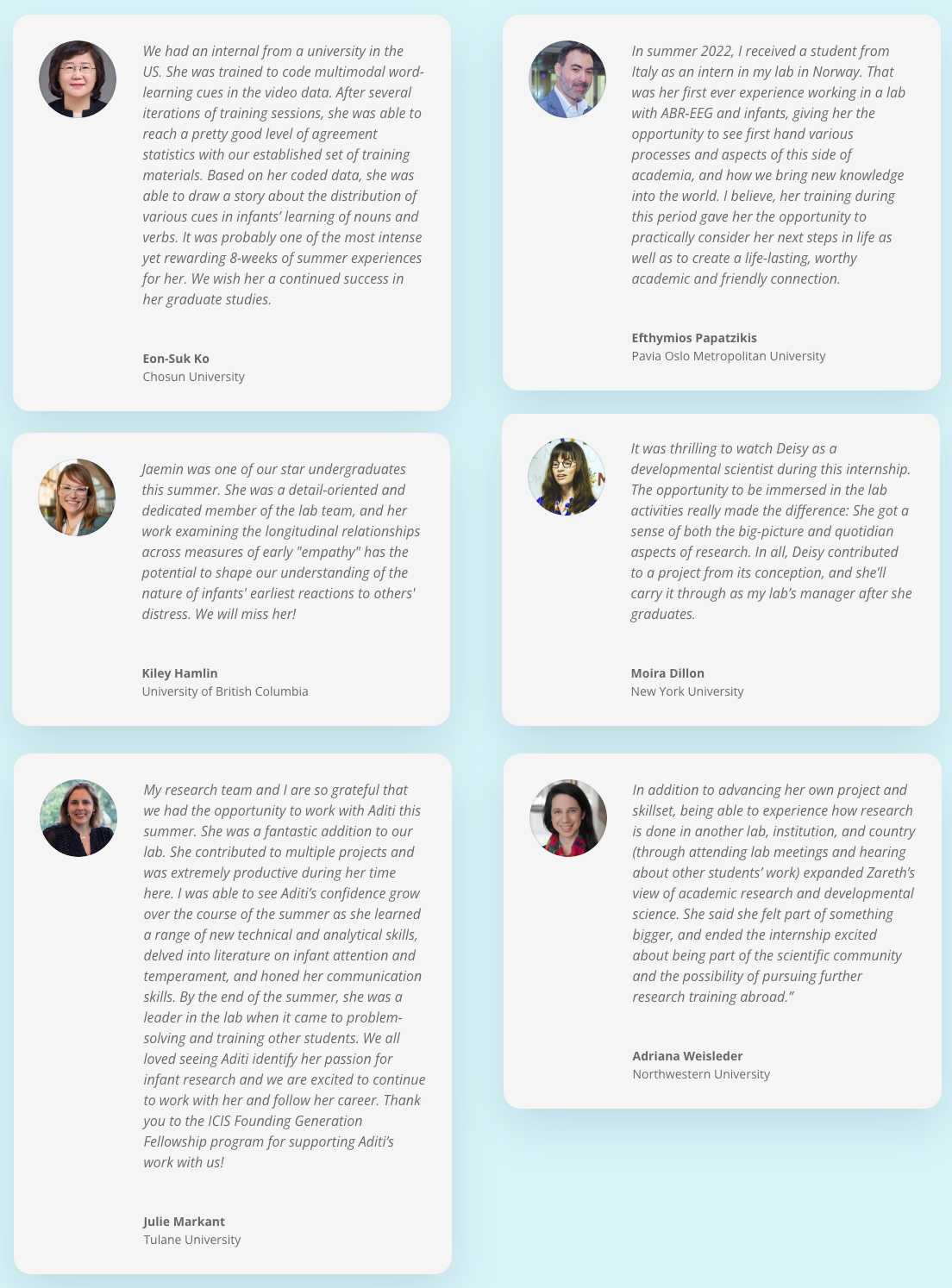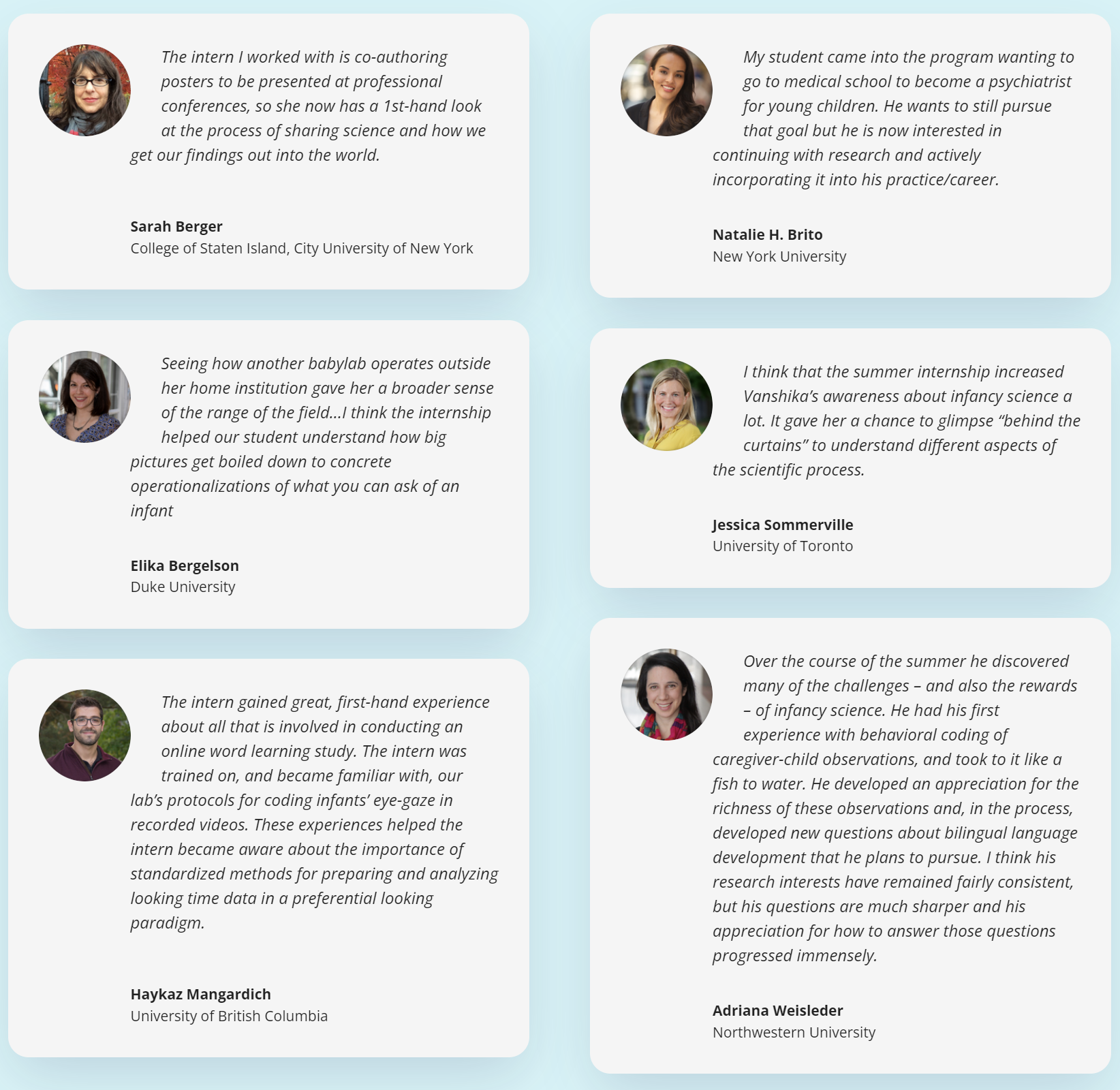ICIS Founding Generation Summer
Fellowship for Undergraduates
Supporting the next generation of infant studies scholars
A core goal of ICIS is to mentor future leaders of the field of infancy. The Founding Generation Summer Fellowship for Undergraduates aims to develop the next generation of scholars to advance innovative research on infancy and translation of research for the public good.
The field of infant research is critical to understanding human development and the application of research findings to education, health, and policy worldwide. This kind of research and outreach requires the participation of individuals from a wide range of backgrounds. Unfortunately, that breadth of representation is lacking.
To address the urgent need of broadening the representation of students, ICIS has created paid summer fellowships. We encourage all interested students to apply, especially those from under-represented and under-resourced backgrounds, as well as any students who are in the first generation of their family to attend college.
The program pairs promising students with researchers from around the world who conduct cutting-edge science. Identified mentors will work with students over an intensive 8-week period. Students receive financial support (up to US$4,000) to enable them to meet with mentors, participate in lab meetings, work with staff, doctoral students and postdoctoral fellows , and build critical skills through hands-on training in research methods. Mentors may also choose to support a portion of the $4000 stipend for the support of a student. Upon completion of the fellowship, students present their work at a dedicated virtual symposium, and are encouraged to submit their work at the 2026 Congress (they may apply for travel support).
Recognizing the Founding Generation
This initiative builds on prior ICIS programs, recognizes ICIS forebears, and honors the contributions of key figures in the Congress’s establishment. The brief history of ICIS (below) describes the individuals who inspired the creation of the Founding Generation program.
Read more...
The Founding Generation Summer Internship Program was established to recognize the contributions of past scholars of infancy studies by supporting the next generation of researchers in infancy. The origins of ICIS, which was known as ISIS (International Society on Infant Studies) from its inception until 2015, can be traced to an informal, interdisciplinary group of 30-50 researchers (the Correspondents on Research on Infants or CRI) that included Psychologists, Pediatricians, Psychiatrists, and Neurologists. CRI members—representing nearly all the major infancy researchers at the time—began to meet in the early 1960s to share their work on infant development. A sub-group of CRIers met monthly in New York and New Jersey, including Marc H. Bornstein, Nathan Fox, Judy Gardner, Bernie Karmel, Michael Lewis, David Lewkowicz, William Fifer, Susan Rose, Holly Ruff, and Gerry Turkewitz. Others who often often visited the group included Joe Fagan, Robert Fantz, Marshall Haith, Bill Kessen, Marian Sigman, and Daniel Stern.
At the time, advances in medicine and increased numbers of premature and sick infants surviving pregnancy and childbirth led to an explosion of infant research. The rapid expansion in infant research highlighted the need to establish an independent venue for CRI members to share their theoretical work and empirical research.
As a result, the first International Conference on Infant Development was organized in Providence, Rhode Island in 1978, under the leadership of Lewis Lipsitt. (Notably, Lewis set the stage for ICIS meetings to have an element of fun mixed in with serious science by inviting a professional yo-yo master to teach researchers how to use a yo-yo!) For several years, the larger ICIS conference followed CRI meetings, being held in whichever city served as the designated CRI site. The local CRI researcher served as program chair and made all arrangements (including signing contracts for hotel “rack rates” and determining the location of the conference dinner). The broad appeal of the ICIS conference ensured its success: registration fees consistently exceeded costs, allowing the congress to consistently meet in the off-years of SRCD.
In addition to hosting the first ICIS conference in Providence, Lewis Lipsitt served as founding editor of Infant Behavior and Development (IBAD), which grew further under the vision of Carolyn Rovee-Collier during her 18-year tenure as editor. Lipsitt and Rovee-Collier also founded and co-edited the series Advances in Infancy Research, to which many original CRIers contributed.
Although ICIS members adopted IBAD as their unofficial journal, by the 1990’s the Society wanted a journal that it could independently control. In response, Esther Thelen (President of ICIS at the time), Rachel Keen (President-elect), Nathan Fox, and Marian Sigman negotiated with the assistance of Attorney Jeff Pasek the new journal Infancy with Lawrence Erlbaum in 2000. Leslie Cohen served as the first editor of ICIS’s flagship journal, followed by Richard Aslin, Martha Ann Bell, John Colombo, and Gavin Bremner as current Editor.
Committee Members
Sarah Berger, The College of Staten Island, CUNY (Chair)
Martha Arterberry, Colby College
Rachel Barr, Georgetown University
Natasha Kirkham, Birkbeck, University of London
Samuel Putnam, Bowdoin College
Jesse Snedeker, Harvard University
Gabrielle Strouse, University of South Dakota
Jessica Summerville, University of Toronto
Sonya Troller-Renfree, Teachers College, Columbia University
“In reflecting upon my career and the many intellectual threads that influenced my scholarship, I realized that my primary allegiance has consistently been aligned with ICIS. It is the biennial meeting I always attend, the focus of my research on human development, and the set of colleagues with whom I unequivocally identify. It was natural, therefore, when I was able to make a gift to a scientific organization, that I would direct my gift to ICIS. I hope that others who feel the same way about ICIS as I do will consider adding their support to the Founding Generation Fund so that our discipline remains vibrant and relevant to the next generation of scholars.” – Anonymous Donor
Visit our Application Page
Celebrating an outstanding 2025 cohort
Thoughts from our Students
Thoughts from our Mentors
Thank you ICIS for giving me the opportunity to mentor Alexa this summer! She dove enthusiastically into learning about our topic and asked important questions, contributed ideas, and provided feedback as we developed and refined our new coding protocols. She also traveled with us to an interdisciplinary conference in Washington, D.C., that brought together academic researchers and policymakers. Alexa engaged thoughtfully and professionally as she connected with colleagues from around the world. She has been an asset to our team, and I’m confident she will continue to thrive in future academic and professional settings.
The Child Brain and Perception lab’s summer was elevated by Tamanna Dharamsey’s contributions. Without her curiosity and dedication, we would not have been able to develop and implement a new event-related potential study in just 8 weeks! It was a joy and privilege to mentor Tamanna for the ICIS Founding Generation Summer Fellowship. I look forward to working with future students who are eager to learn and build their experience working in an infant lab.
This summer I had the privilege of mentoring Jocelyn Zacarias through the ICIS Founding Generation Summer Fellowship. Jocelyn brought curiosity and dedication to every aspect of our work, quickly developing skills in data analysis and making thoughtful contributions to our research on infant brain and behavior.
Serving as a mentor in this program was inspiring—I was able to watch Jocelyn grow as both a scientist and a collaborator. The fellowship provides invaluable opportunities for undergraduates to engage in hands-on research while allowing mentors to help shape the next generation of scholars in infancy studies.
I mentored Patrizia Picado this summer. She focused on learning about parent-child interaction during an intervention project and naturalistic learning conditions. It was a wonderful experience for me to see how rapidly she learned how to measure parent-child interactions, to attend her first conference with her and to discuss her future professional goals. She was an excellent member of the team and made immense contributions to our project. I am happy to know that she is going to pursue graduate training in developmental psychology.
Fellowship Archive
2022 Cohort
Building on the success of the initial cohort, in the summer of 2022, ICIS paired 6 undergraduate students with mentors. Testimonials from mentors and students show that participants greatly valued their experience. Students highlighted many benefits of the program, including learning about developmental science and gaining a deep appreciation and knowledge of a specific area of infant research. The summer fellowships inspired, educated, and enabled students in a variety of ways.
2021 Cohort
In the summer of 2021, ICIS paired 8 undergraduate students with mentors. Testimonials from mentors and students show that participants greatly valued their experience. Students highlighted many benefits of the program, including learning about developmental science, gaining a deep appreciation and knowledge of a specific area of infant research; acquiring skills, research tools and know how in behavioral coding, brain recordings, statistical analyses, and research dissemination.
The summer fellowships inspired, educated, and enabled students in a variety of ways.
Fellows from 2021 reported that the experience gave them a greater awareness of infancy science, with experiences that were both broad and deep: